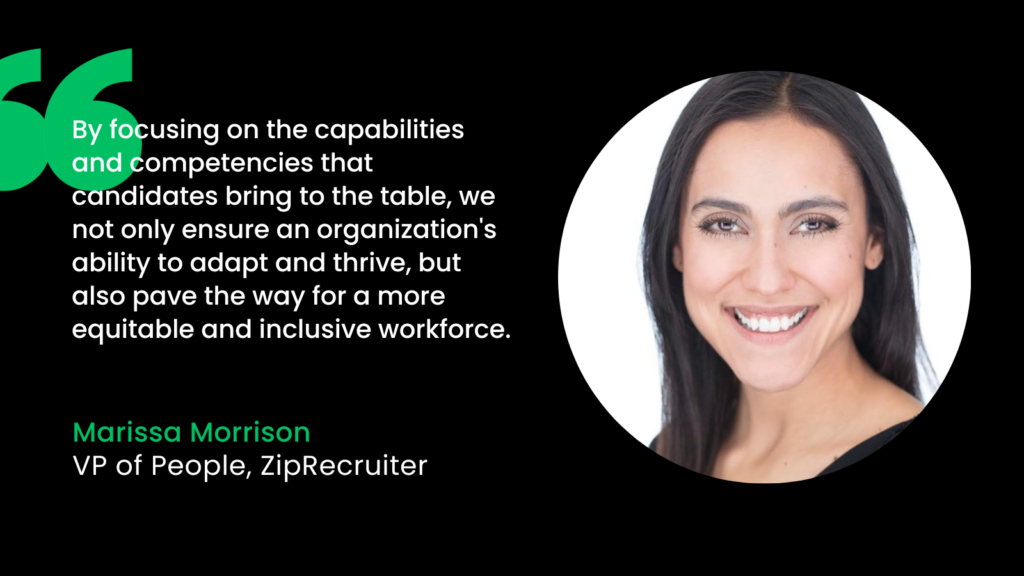The following findings are based on the results of ZipRecruiter’s first Annual Employer Survey, providing an in-depth look into the challenges, motivations, and latest hiring practices of employers across the U.S.
Top takeaway: Employers are ditching degrees and embracing skills-based hiring—especially in the wake of skills shortages, post-pandemic college enrollment declines, and a widely acknowledged college affordability crisis.
In just the past year, several major companies and multiple state governments have announced that they are dropping degree requirements for certain roles. It is unclear whether this shift towards “skills-based hiring”—an approach that prioritizes competencies over traditional credentials—is a response to the post-pandemic decline in college and community college enrollment; declining in enrollment in certain fields, such as finance and accounting; rising concern about college affordability; rising skepticism about the value of a degree amid grade inflation and generative AI; the increased availability of cheaper online alternatives; or increased commitment to expanding workforce diversity. Whatever the cause, the trend appears to be gaining momentum.
ZipRecruiter surveyed 2,000 employers about skills-based hiring and found that it is widely practiced by companies of all sizes and across industries. 45% of respondents said their companies had dispensed with degree requirements for some roles in just the past year, and 72% said they now practice skills-based hiring, prioritizing skills over certificates. Small and medium-sized businesses, those most likely to be experiencing hiring challenges, were more likely than major enterprises to have dropped degree requirements (47% vs. 35%) and to have adopted the skills-based approach (73% vs. 67%). Respondents did acknowledge some resistance to the approach, however. For example, 53% cited “hiring manager insistence that candidates have a specific background (e.g. a college, degree)” as a major barrier to company diversity, equity, and inclusion efforts.
Employers aren’t simply leaving candidates to develop required job skills on their own but are increasingly investing in workforce development, both by subsidizing degrees through student loan repayment and tuition assistance and by developing alternative pathways to skills development, such as employee training programs. Employers broadly perceive these investments to have positive impacts on recruitment and retention.
The survey data is consistent with job postings data from the ZipRecruiter marketplace. The share of job postings listing a bachelor’s degree as a requirement fell 10% between 2022 and 2023 to date, whereas the shares of job postings offering candidates training and tuition assistance rose 31% and 24%, respectively.

OTHER TOP FINDINGS
Enduring Skills Gaps and Emerging Solutions
- Perceived Skills Gaps and Barriers to Hiring. 23% of employers say they’ve been prevented from filling a vacancy in the last 6 months by a lack of candidates with the required education and training.
- The Soft Skills Gap. Employers aren’t only struggling to find candidates with the right technical skills and qualifications. When asked about the top traits employers are looking for in potential hires, two of the three are soft skills (work ethic & enthusiasm for the role).The top 3 skills employers say are most lacking in the candidates they interview are:
- Time management (47%)
- Professionalism (43%)
- Critical thinking (39%)
- Hiring for Skills, Not Certificates. The majority of employers—72%—said they practice skills-based hiring, prioritizing skills over degrees. 45% of employers say they have dispensed with degree requirements for some roles over the past year. ZipRecruiter marketplace data shows that the share of jobs requiring bachelor’s degrees fell by 10% between 2022 and 2023 to date.
- New Ways to Assess Candidate Skills. 43% of employers say they are using online skills assessment platforms to measure candidates’ competencies, rather than relying on degrees or certificates alone.
- Helping Employees Develop Skills for Success. Facing skills gaps, employers are prepared to make investments in candidates with the right soft skills. 10% of employers said they added student loan assistance to their benefits packages, 15% said they added tuition assistance, and 30% said they added new employee training and development programs in the past year.
- The Benefits of Skills Investments. Many employers believe that investments in employee skill development substantially improve recruitment and retention. 53% of employers said they believe offering employee training programs has a large, positive impact on recruitment and retention, 48% said so of tuition assistance programs, and 48% said so of student loan repayment programs.
- AI and Skills Gaps. As AI improves, it will increasingly be able to plug some of the skills gaps with which employers are grappling. 48% of employers said they are already replacing some roles with AI.
- The Need for AI Skills. Even as some employers start replacing roles with AI, however, many more (57%) say they are looking for candidates with AI skills.
- Why the Skills-based Approach Makes Sense for Workers. Prior ZipRecruiter research on job seekers and newly hired workers has found that 36% of successful job seekers learn a new skill, take an online course, or gain a new certification to get a new job. Furthermore, about half of job switchers don’t just switch jobs but also change industries or occupations. In other words, there are many candidates who may lack the traditional qualifications for a role but who are eager to reskill—especially with employer-provided guidance or assistance.

SKILLS-BASED HIRING CHARTS
Survey Methodology: ZipRecruiter conducted a national online survey between July 7 and August 1, 2023, to explore employer attitudes toward recent hiring trends and their experiences of current U.S. labor market conditions.
The survey was administered to a Qualtrics panel of 2,000+ verified talent acquisition professionals and hiring managers, each of whom has considerable responsibility for hiring processes and decisions. They were drawn from businesses of various sizes across a wide range of industries.
In addition to standard screening and demographic questions, respondents were asked about their recruiting, hiring, employment, and retention practices, as well as their expectations, desires, and requirements for future talent acquisition activities.








